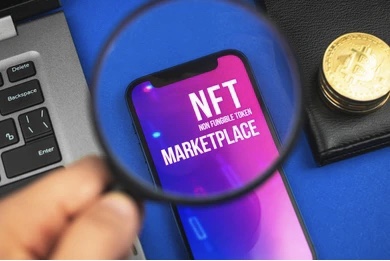Non-fungible tokens have come a long way. What started as a pixelated picture in 2014 has grown to become one of the most critical assets in DeFi, evolving from being experimental to something that solves real-life problems. Although they emerged to facilitate digital ownership and allow artists to digitalize their artworks, NFTs have broadened into other use cases.
From identity and social to gaming and fashion, the utilities of NFTs have gone beyond just art and collectibles. Interestingly, you can use this as collateral for DeFi loans and use it to shop in the metaverse, the virtual economy. NFTs wouldn’t stop evolving and given their vast use cases, the adoption rate would continue to shoot up.
However, the adoption wouldn’t have been possible without marketplaces. An NFT marketplace is the life wire of the sector where everything occurs. Without it, the NFT sector would be another fad or passing trend. So, what’s this marketplace and its uses?
An NFT Marketplace Explained
NFT marketplaces serve as a platform where people can mint, trade, purchase/sell, and showcase their assets. They serve as the link between content creators and buyers. They are built on blockchains, such as Solana and Ethereum. Examples of marketplaces are OpenSea, Nifty Gateway, SuperRare, Snowcrash, etc. The first three platforms run on Ethereum, while Solana supports Snowcrash.
You can liken an NFT marketplace to a stock market where shares are acquired and sold. Unlike digital currencies, you can’t purchase NFTs on exchanges because they are not fungible.
But is a marketplace all about trading and minting NFTs? The earliest marketplaces concentrated on the art of buying and selling digital collectibles. Down the line, more marketplaces have emerged with additional features, such as fractionalization of assets, tokenization, and automated trading.
To access a marketplace and make purchases, you need three things; a cryptocurrency wallet, cryptocurrencies as a mode of transaction, and an account. Crypto wallets, such as Trust wallet, Sollet, and MetaMask, store digital currencies. You must select a wallet compatible with the blockchain that supports the marketplace.
Next is to fund the wallet with the cryptocurrency native to the chain that supports the marketplace. In the case of OpenSea that runs on Ethereum, you’ll have to add ETH o your wallet equivalent to the intended item of purchase. Marketplaces like Snowcrash require you to fund the wallet with SOL.
After this, you need to create a user profile on the marketplace. Although the initial process is similar, each website may differ in the kind of details required. You must fill in all the necessary details to use the marketplace. With a funded wallet and a completed user account, you can purchase collectibles conveniently by placing bids.
Features an NFT Marketplace
The current crop of digital marketplaces offers a wide range of tools that allows the user to perform different tasks. Aside from minting and trading items, a marketplace does the following.
As you know, NFT items can be costly, and not all buyers have the deep pocket to acquire the item completely. Some marketplaces allow buyers to own an NFT without fully paying for it. That’s what’s fractionalization means.
Like CeFi, DeFi has made it possible for users to access loans with collateral. These days, NFT platforms allow users to borrow funds against their NFTs. Once the loan has been completed, the user can reclaim the asset.
Transferring ownership of real-world assets can be difficult. However, a marketplace solves the issue through tokenization. It means that owners can create a digital token through blockchain to represent the physical asset.
Final Take
Marketplaces are crucial elements of the NFT sector. However, there are still some bottlenecks, which can be attributed to the blockchain they run on. For example, the smart contract can be exploited, and when this happens, hackers cater away with valuable items belonging to the owners.
As NFTs dominate the DeFi landscape, we expect more marketplaces with better features than the current ones to emerge.
This is a Contributor Post. Opinions expressed here are opinions of the Contributor. Influencive does not endorse or review brands mentioned; does not and cannot investigate relationships with brands, products, and people mentioned and is up to the Contributor to disclose. Contributors, amongst other accounts and articles may be professional fee-based.

